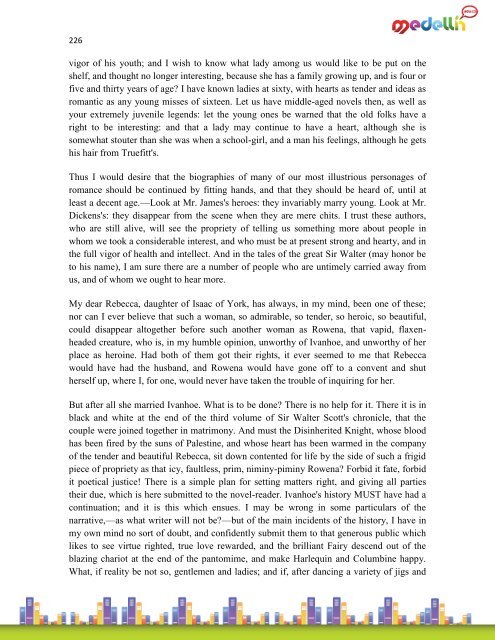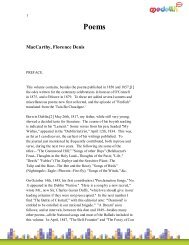- Page 1 and 2:
1 William Makepeace Thackeray GEORG
- Page 3 and 4:
3 In the midst of the shop and its
- Page 5 and 6:
5 Inspired by Millwood and love, Ge
- Page 7 and 8:
7 Meanwhile the conversation at But
- Page 9 and 10:
9 with these is like Him who wander
- Page 11 and 12:
11 me, that whether for good or ill
- Page 13 and 14:
13 chateau in Normandy, out of the
- Page 15 and 16:
15 of water in Mendoza's hand)—"a
- Page 17 and 18:
17 respectable, and a shekel despic
- Page 19 and 20:
19 rings to their rosy tips, and pr
- Page 21 and 22:
21 He was an old man—an old man e
- Page 23 and 24:
23 other to our guest, a prisoner;
- Page 25 and 26:
25 "Taisez-vous!" said he, putting
- Page 27 and 28:
27 "That lovely angel is the Lady B
- Page 29 and 30:
29 As the couple were footing it, t
- Page 31 and 32:
31 made to me. "I knew it would be
- Page 33 and 34:
33 This was too much. "Here goes!"
- Page 35 and 36:
35 "'Twas well done of thee, Philib
- Page 37 and 38:
37 That the Baron Raoul levied toll
- Page 39 and 40:
39 The old Countess of Chacabacque
- Page 41 and 42:
41 man of blood. The weeping garris
- Page 43 and 44:
43 beheld the awful change that dis
- Page 45 and 46:
45 the pit of the "Hoperer" in a gr
- Page 47 and 48:
47 III. The tall footman, number fo
- Page 49 and 50:
49 "Infame," howled Borodino, "tu l
- Page 51 and 52:
51 "The members of the haughty and
- Page 53 and 54:
53 counter or the chestis, indulgin
- Page 55 and 56:
55 "Oh, wee," said the Erl of Yardh
- Page 57 and 58:
57 They lived in tremenjus splendor
- Page 59 and 60:
59 "The business of the Republic, s
- Page 61 and 62:
61 II. Leatherlegs and Tom Coxswain
- Page 63 and 64:
63 Portsmouth, having passed the ch
- Page 65 and 66:
65 "'We are poor, Eliza,' said Harr
- Page 67 and 68:
67 "Report says, that even in his h
- Page 69 and 70:
69 'Miss M. A. Hoggins, Buckley Squ
- Page 71 and 72:
71 my TRENT VALLY, for it was the p
- Page 73 and 74:
73 "Wen I anounced in the Servnts A
- Page 75 and 76:
75 "2nd July.—Rode my bay oss Des
- Page 77 and 78:
77 "I practis ridin and the acquire
- Page 79 and 80:
79 dignified hair. I, of coarse, ro
- Page 81 and 82:
81 "I have caused one of our ingine
- Page 83 and 84:
83 clothes my highlids—the eyedea
- Page 85 and 86:
85 * This refers to an illustrated
- Page 87 and 88:
87 "Thusday Night.—O Hangelina, H
- Page 89 and 90:
89 of my hancisters) had conquered
- Page 91 and 92:
91 "It was Mary Hann who summind th
- Page 93 and 94:
93 "'What a sacrifice!' says she; '
- Page 95 and 96:
95 And thirty score of British bows
- Page 97 and 98:
97 Hill Street and cumsult the Lady
- Page 99 and 100:
99 noble parents of the Lady Angeli
- Page 101 and 102:
101 "THIRD EDITION. "GRETNA GREEN,
- Page 103 and 104:
103 "I went home like a maniack, af
- Page 105 and 106:
105 caused deep emotion to the vene
- Page 107 and 108:
107 again; and Jack Deuceace, who h
- Page 109 and 110:
109 come forwoods, and igspress my
- Page 111 and 112:
111 "'Twenty-three in all,' says I.
- Page 113 and 114:
113 "'My boy! my little boy!' says
- Page 115 and 116:
115 the "Pons Asinorum" (4to. Londo
- Page 117 and 118:
117 of most part of the passengers,
- Page 119 and 120:
119 is known, count in Italy from o
- Page 121 and 122:
121 The black ruffians took the hin
- Page 123 and 124:
123 full gallop, his own sword maki
- Page 125 and 126:
125 good feeling, to steal from me
- Page 127 and 128:
127 who followed him!—when at len
- Page 129 and 130:
129 Well, immediately after the cap
- Page 131 and 132:
131 son Emanuel, then a little boy;
- Page 133 and 134:
133 CHAPTER III. A PEEP INTO SPAIN
- Page 135 and 136:
135 within, as I said, a hundred ya
- Page 137 and 138:
137 sufficient be it for him, howev
- Page 139 and 140:
139 With such an air as Mars to bat
- Page 141 and 142:
141 and sketcher. On the brow of a
- Page 143 and 144:
143 "'My soul's adored!' replied I.
- Page 145 and 146:
145 THE INDIAN CAMP—THE SORTIE FR
- Page 147 and 148:
147 was in the field, it was said t
- Page 149 and 150:
149 Well, the right eye of the Sun
- Page 151 and 152:
151 so on, according to the novelis
- Page 153 and 154:
153 fashion, taking, every now and
- Page 155 and 156:
155 each other, and you will give m
- Page 157 and 158:
157 I bade Ghorumsaug help me to pu
- Page 159 and 160:
159 (the sweetest, sure, that ever
- Page 161 and 162:
161 "Law! Mr. Gahagan," said Mrs. C
- Page 163 and 164:
163 valet said that Gahagan Sahib w
- Page 165 and 166:
165 The elephants were standing, th
- Page 167 and 168:
167 of powder are?" He did. "You kn
- Page 169 and 170:
169 SURPRISE OF FUTTYGHUR. When I a
- Page 171 and 172:
171 "A miserable captain—oh shame
- Page 173 and 174:
173 Three o'clock came: the sun was
- Page 175 and 176: 175 Abmednuggar, to Belinda, second
- Page 177 and 178: 177 gentleman then possessed, would
- Page 179 and 180: 179 and his shoulders. His eyes alt
- Page 181 and 182: 181 company of gallant knights afte
- Page 183 and 184: 183 THE FESTIVAL. The festival was
- Page 185 and 186: 185 "What mean ye?" cried Count Lud
- Page 187 and 188: 187 Buffo's solitary. A silver bear
- Page 189 and 190: 189 a ghastly spectacle, as, reelin
- Page 191 and 192: 191 "What has chanced?" said the in
- Page 193 and 194: 193 the Margrave had despatched to
- Page 195 and 196: 195 and resolution: my first attemp
- Page 197 and 198: 197 The archers replied, "You seem
- Page 199 and 200: 199 The archers, after standing a l
- Page 201 and 202: 201 The latter laid him down for wa
- Page 203 and 204: 203 "There are more things in heave
- Page 205 and 206: 205 That he did not find them was n
- Page 207 and 208: 207 mountebanks, the party-colored
- Page 209 and 210: 209 young hero with the golden hair
- Page 211 and 212: 211 The next day, the young gentlem
- Page 213 and 214: 213 When the frightful act had been
- Page 215 and 216: 215 round the herald's neck. "An in
- Page 217 and 218: 217 of fish hast thou cooked for th
- Page 219 and 220: 219 balls; the mighty horses trembl
- Page 221 and 222: 221 In the midst of these entertain
- Page 223 and 224: 223 gone. The Count of Hombourg had
- Page 225: 225 A ROMANCE UPON ROMANCE. BY MR.
- Page 229 and 230: 229 the account of a famous wild-bo
- Page 231 and 232: 231 Then he besought Robin of Hunti
- Page 233 and 234: 233 which his squires led to the do
- Page 235 and 236: 235 THE LAST DAYS OF THE LION. From
- Page 237 and 238: 237 which onset Ivanhoe slew seven,
- Page 239 and 240: 239 I've often wished, I hope no si
- Page 241 and 242: 241 "'But for such unpleasant bygon
- Page 243 and 244: 243 CHAPTER III. ST. GEORGE FOR ENG
- Page 245 and 246: 245 "Now, by St. Barbacue of Limoge
- Page 247 and 248: 247 searching for booty among the d
- Page 249 and 250: 249 Athelstane burst into a loud la
- Page 251 and 252: 251 You might have thought for a mo
- Page 253 and 254: 253 "Pledge me round, I bid ye decl
- Page 255 and 256: 255 and solitary that he would not
- Page 257 and 258: 257 *See Hume, Giraldus Cambrensis,
- Page 259 and 260: 259 and carried away, under a secur
- Page 261 and 262: 261 "I do," said Ivanhoe, clasping
- Page 263 and 264: 263 calm face, his shield upon his
- Page 265 and 266: 265 fury to his cruel disposition,
- Page 267 and 268: 267 "Holy mother! what has chanced?
- Page 269 and 270: 269 Rebecca firmly yet respectfully
- Page 271 and 272: 271 him speak,—after watching him
- Page 273 and 274: 273 Who is the first on the wall, a
- Page 275 and 276: 275 capital was quite secure from f
- Page 277 and 278:
277 has marched in pursuit of the p
- Page 279 and 280:
279 "'Strasburg, xxii. Nivose: Deca
- Page 281 and 282:
281 monasteries again shall ornamen
- Page 283 and 284:
283 With so numerous a family quart
- Page 285 and 286:
285 their childhood: such a power h
- Page 287 and 288:
287 CHAPTER V. THE BATTLE OF TOURS.
- Page 289 and 290:
289 Street, sire," said the hero, b
- Page 291 and 292:
291 CHAPTER VI. THE ENGLISH UNDER J
- Page 293 and 294:
293 The Duke of Nemours, having des
- Page 295 and 296:
295 "Je prie votre Altesse Royale d
- Page 297 and 298:
297 CHAPTER VIII. THE BATTLE OF THE
- Page 299 and 300:
299 On the third day, the cannonadi
- Page 301 and 302:
301 "'There shall be no more povert
- Page 303 and 304:
303 poor ending of our expectations
- Page 305 and 306:
305 We kept them, every one in thei
- Page 307 and 308:
307 satin gown, which, with a blue
- Page 309 and 310:
309 Well, the Thursday came: the ho
- Page 311 and 312:
311 I had nothing for it but to mou
- Page 313 and 314:
313 Well, on looking over the Flare
- Page 315 and 316:
315 me, he had been a very heavy lo
- Page 317 and 318:
317 "Anatole. You would not think h
- Page 319 and 320:
319 which her next-door neighbors p
- Page 321 and 322:
321 "PUNCH HITH LIFE OUT!" roars an
- Page 323 and 324:
323 King of Oude, His Excellency Do
- Page 325 and 326:
325 A TOURNAMENT. "I say, Tug," sai
- Page 327 and 328:
327 the plumes of his helmet mingle
- Page 329 and 330:
329 Fourteen porters came out, and
- Page 331 and 332:
331 "Vy, then, two-and-eightpence,"
- Page 333 and 334:
333 Paris grew dull to us after thi
- Page 335 and 336:
335 Well, the cause was tried. Why
- Page 337 and 338:
337 flung herself into her mamma's
- Page 339:
339 And here we are, back again. An

















